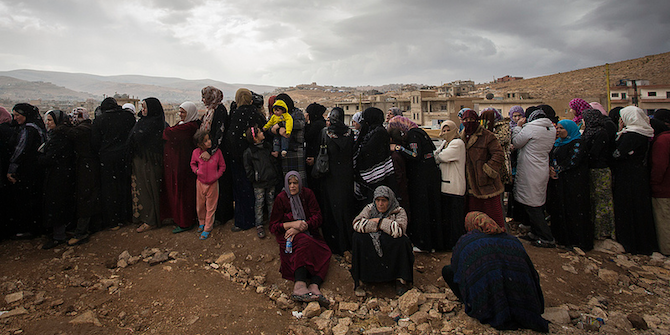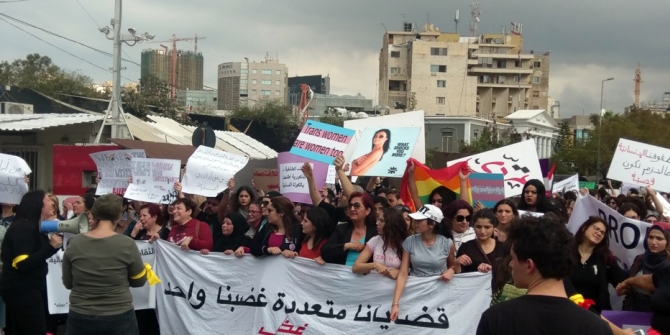by Youmna Cham & Mona Salem

Coverage from Within: What’s happening in Lebanon?
Groundbreaking anti-sectarian protests erupted across all of Lebanon last Thursday, 17 October 2019. Since then, Lebanon has witnessed mobilisation in urban and rural areas with great diversity in terms of class, gender and age. From southern Lebanese villages to Tripoli in the north, a massive citizen-driven initiative has given the country hope that the opportunity is at hand to get rid of a sectarian political class that has ruled with Marie Antoinette-esque indifference and power-hungry viciousness.
This situation has exposed the degrading image of a political élite who have grown wealthier at the expense of the population. Through these massive demonstrations, Lebanese protesters have been able to reveal the extent of the governing class’s poor administration of the country’s finances, with their power based upon unaccountable financial gains and illegal profits.
Western media coverage had labelled the protests a ‘Whatsapp Revolution‘ after the Ministry of Telecommunications proposed a new tax on Whatsapp services. Although this proposed tax prompted this wave of protests, the core problem goes beyond a government tax on a free messaging application.
Time for Change
In truth, protesters have been sickened by the ‘corruption virus’ affecting the body politic of Lebanon and weakening its institutions. This virus has had severe socio-economic repercussions on the country: misery, poverty, unemployment, environmental degradation, violations of basic human rights and unjustified taxes. Recognition of this led people from all sects to descend on the streets to oust the corrupt government. Some are even demanding the recalling of parliament, early elections and the president’s removal. Above all, two common demands can be heard: full accountability for the regime’s illicit gains and socio-economic opportunities for a decent fair living.
What is noticeable is that women from all religions, sects and social classes are coming together, hand in hand, to create a human shield between the protesters and the police. They have proven to be agents of change, taking the lead in their country’s revolution, and are speaking up, denouncing the fear that has been implemented from above.
The demands for the government’s resignation have been followed by the public denouncing of all sectarian leaders, encapsulated in the slogan: ‘Kellun ya’ne Kellun’ (‘All of them, meaning all of them’). This charge clearly shows the limited appeal of sectarianism within the movement. Sunni, Shia, Druze and Christians are bonding in a striking show of compassion and tolerance towards each other, forging national unity and common solidarity based on fair socio-economic demands and the desire for improved political and economic reforms.
This is a cataclysmic moment in Lebanon’s history, transcending party allegiances to revive the message of the Lebanese national anthem: ‘Kulluna li-l-Watan’ (‘All of us, for our country!’). This people’s movement is distancing itself from the country’s ‘adulated’ political leaders and calling for a leadership that truly represents the populace.
Despite the catalyst moment, structured obstacles should be highlighted. The ossified regime, reliant as it is upon sectarianism, is deeply embedded in the Lebanese political system; its practices reproduce sectarian identities.
Sectarianism in Lebanon is initiated via a top-down approach through populist discourse and clientelist structures. In fact, clientelist relations are based on financial dependency which restrains people from mobilising against those who provide for them, in fear of being cut off from access to resources and services. Through these waves of protests, the people of Lebanon have finally proved their detachment from a corrupt, sectarian elite that has been occupying state institutions and initiating policies that benefit their own interests since 1989.
Despite the imposed sectarian divisions that have been recurring in common political discourses over the past few decades, a national conscience has finally been revealed amongst the people. A sense of national belonging is slowly being constructed and developing within different socio-economic areas.
Today, the first reflections of de-sectarianisation can be seen across the country where Tripoli, a Sunni majority city, has chanted in support of Dahyeh, a Shia suburb of Beirut, or as Christian areas such as Zouk el Mosbeh stood in solidarity with Tyr, a Shia majority city. Through these spectacular demonstrations – quite monumental by all Lebanese standards – we are witnessing the rise of a strong, bold and fearless national movement overflowing with patriotic solidarity, multi-ethnic compassion, and acceptance of the other, while exposing the culture of oppression and injustice that prevailed all those years in the name of al-ta’ifiya (confessionalism).






